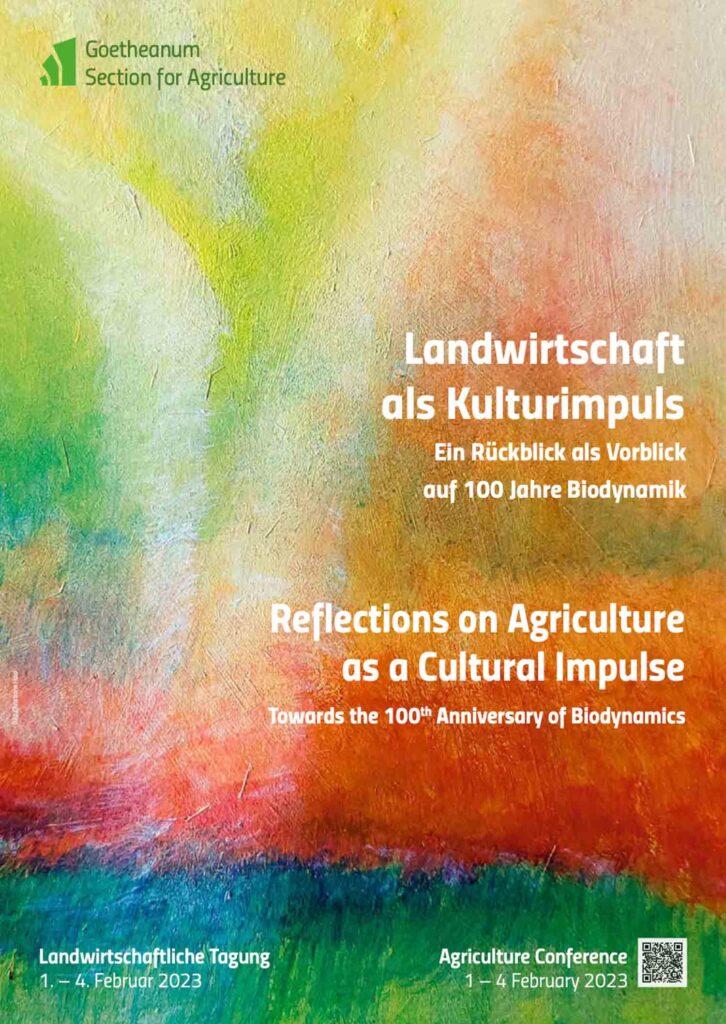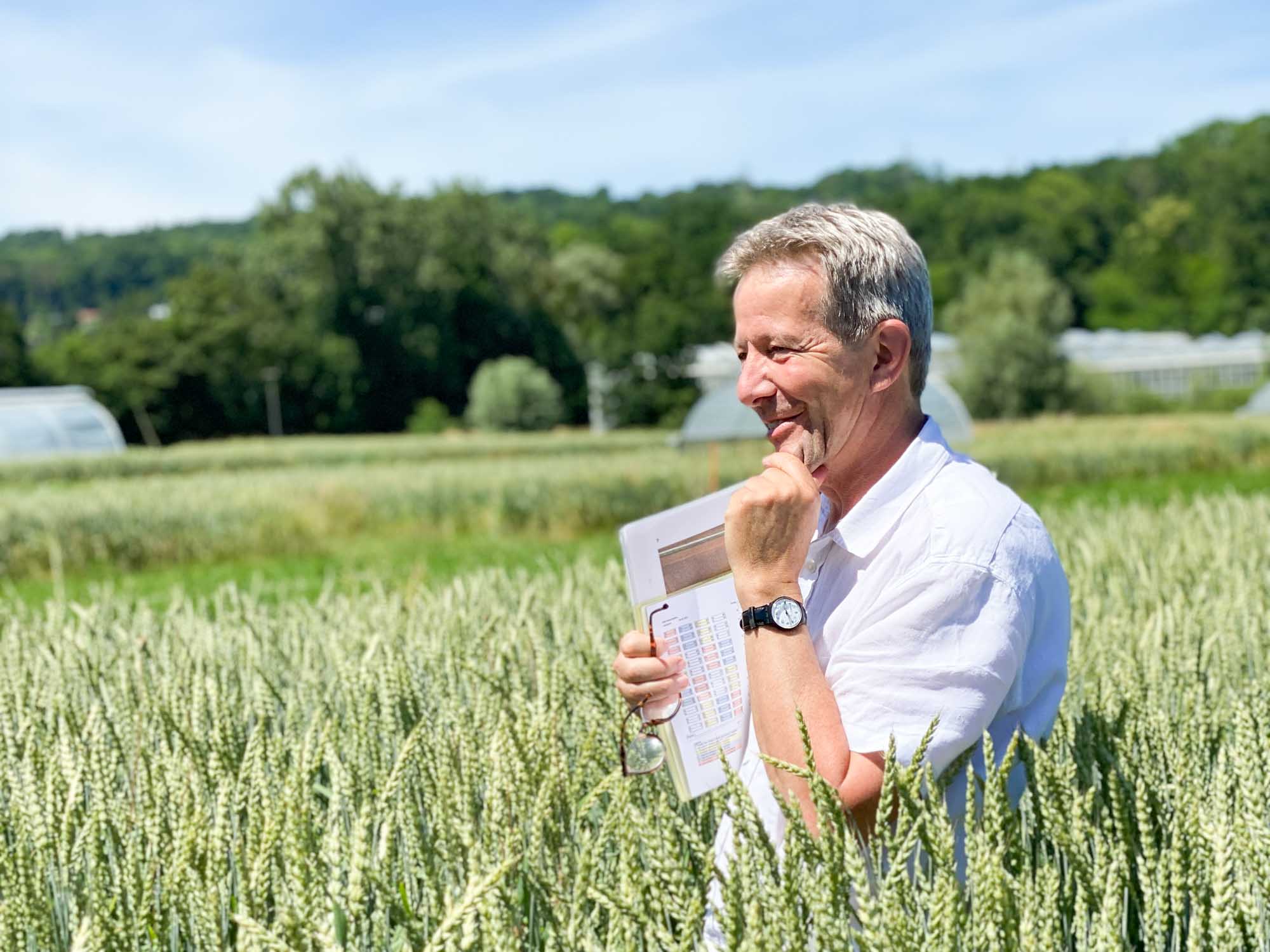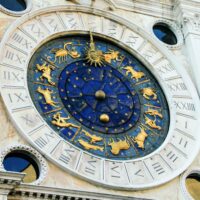One hundred years of Biodynamics and ten thousand years of agriculture. An interview with Ueli Hurter on the Agricultural Conference 2023. Wolfgang Held conducted the interview.
«A Retrospective as a Preview» is the subtitle of the upcoming meeting of the Section for Agriculture. What does this mean?
Ueli Hurter We are planning a trilogy. We do not want to push everything into one conference, into one moment in 2024, when we celebrate 100 years of the «Agricultural Course.» In 2024, we intend to focus on the impulses of the «Agricultural Course» and to answer the question of how these impulses live or should live today. This will be all the better the more we succeed in looking back now, at the next meeting of our movement. We understood that our agriculture did not start with Koberwitz in 1924. The beginning of the story extends further into the past. That is why we now add in history, the genesis of agriculture since its beginnings perhaps 10,000 years ago.
So the retrospective is twofold: the history of Biodynamic Agriculture and the history of agriculture itself.
The term «cultural impulse» is key for us and has been part of agriculture for 12,000 years. Agriculture has shaped the entire human culture. This term is reflected in the conference program. We start with seven or eight short contributions on the 100-year life of Biodynamic Agriculture, from plant breeding to research and farm development. Then follows the broad view until Göbekli Tepe, the first urban settlement of humanity in 11,000 BC. Arzu Duran, pioneer of Turkish Biodynamic Agriculture, and Martin von Mackensen (Dottenfelder Hof) span this arc to the origins of agriculture. I am delighted that we were able to bring in Vandana Shiva again. The alternative Nobel Prize-winning eco-activist will talk about the rediscovery of the sacred in agriculture. This view then leads us back in time again. Anthroposophically, we can say: to the original Persian culture. Since then, the cultural impulse of agriculture has lived in many variations and was then gradually desecrated and utilized to lead to genetic engineering in our time. With this broad look back, we can say that looking to the future is about a healing of the Earth and a renewed sanctification of the Earth.
Presumably, agriculture still carries the past today more than other fields of life.
Yes, and yet we had not planned this broad reach into prehistoric times. It became apparent in the discussions in the circle of representatives, where we dealt with the topic. In fact, agriculture works with long cycles. The past is still alive. In three short contributions, we expand this issue to include the three spatial dimensions of agriculture by asking about the cosmic, terrestrial, and atmospheric sources of agriculture. Here, too, the speakers will speak about 100 years, sometimes about 100 times 100, i.e., 10,000 years.
What do you hope to gain from the conference?
We hope that everyone involved in Biodynamics will reflect back in time. You may ask yourself: «From whom did I actually get this Biodynamic impulse?» «And from whom did he or she get it?» Then you realize: after three or four such transfers of knowledge and action, you are at the origin and Koberwitz. That is, it is far away and, at the same time, very close. I wish everyone had this experience: I am a carrier of an impulse that had its starting point in the distant last century. But I am close to this impulse when I go into retrospection, not originating from Koberwitz but going back in time, starting from myself.
And this movement can now be scaled up?
Yes. Then years turned into centuries, and I noticed: the entry of modern science into agriculture around 1840 with Justus von Liebig – that was only just now. And then, I go further back and come to the replacement of the three-field economy with the introduction of stable feeding. I «ride» even further back and come to the Scottish monks, who were no longer serfs and day laborers, but farmers who farmed and carried the Christ impulse. One goal of the conference is to get involved, so the past becomes a personal experience, which the organizations, the regional associations, and the professional associations now follow. We have a history, and our responsibility in the future is based on the past, both Biodynamic and the overall historical past. In this way, we create a spring that leads us into the future. The future is not just the continuation of the past. By making the past our history, we can deal with it freely.
And what cliff is there?
The challenge is to perceive and take others seriously in their history, which is different from one’s own. In Germany, people think back to 1924. You can’t do that in Brazil. Nor in Tanzania. How is it in India? And how is it in Thailand, where there is perhaps just under a ten-year history of Biodynamics?
Where is the reality? Is it at the beginning, or is it created by what life has brought in 100 years?

It’s both. But one should not be fixated on anything but bring things into reciprocity. I am interested in everything original. We have reissued the «Agricultural Course.» I’m interested in the details. But not because I think it’s a relevant reality, but because there are seeds. What has become of Biodynamics, and what is the potential that will become of it?
Have you worked through the topics of the «Agricultural Course» «completely»?
It’s like it is in one’s personal life: we think that we have thought through our themes, but they come around again. And so, I think, for example, it is about the design of a business organism that was carried out in the first 100 years. And I would say that we have illustrated it scientifically with the DOK experiment1.
I’ve just come from Sekem: What about Biodynamic cultivation in the desert? We have found answers to these questions. The same applies to preparations, plant breeding, and food quality. When the time comes, we will ask all these questions on a higher level, anew. This is especially true for unresolved questions, such as the so-called «ashing».
What is a highlight of the upcoming conference for you?
The panel on Friday at 5 pm: Women as pioneers in Biodynamics. We make a gesture of reparation towards all the women who have shaped this century and millennia and of whom we never speak. These are primarily only women! A woman will moderate the discussion. Oh, and I hope that the Goetheanum, i.e., all instances at the Goetheanum, will take note of this. I wonder if this has ever happened before.
Is the generational change similar to that of Waldorf schools?
Yes, but we are not the first generational change to represent a threshold. But now there is actually a change. I am now one of the 60- to 65-year-olds who bear responsibility in the movement. That’s where the handover begins, but we’re not «gone.» In general, the question must be asked: who will still be doing agriculture in the future? Similar to the nursing professions, you won’t find anyone for the field. Agriculture, which has been inherited from time immemorial, is dying out. In the countryside, there are few offspring. Fortunately, in every generation, young people from the city also find their way to the countryside. They are looking for the future, and in many countries, they meet us older people, and we learn Biodynamics together. Every time it is new, and every time it is a great joy. Just now, we have held four training conferences on 4 continents: Malaysia, Zimbabwe, Switzerland, and Peru. The Biodynamic movement is growing.
We will also be devoting ourselves to another aspect at the conference: the question of fate. Under the title «What are we? Who are we?» I will lecture around fateful questions in the Biodynamic movement. Rudolf Steiner also gave lectures on karmic relationships at the same time as the Koberwitz course. The lectures on agriculture at the Koberwitz estate took place at 11 am, and in the evening, Rudolf Steiner spoke about karma in Breslau. The same people who listened to him on agriculture followed him again when it came to karmic questions. Both questions – fate and agriculture – are intertwined. Personal destiny and that of the Biodynamic impulse may perhaps be seen in a human context: that it is less about saving the Earth for its own sake, but because people want to continue to incarnate on Earth, i.e., for the sake of the future populations. Feeling responsible for them means keeping the location for the unfolding of karma, Earth, alive.
Reflections on Agriculture as a Cultural Impulse: Towards the 100th Anniversary of Biodynamics. Agriculture Conference 2023: 1–4 February 2023.
More Agriculture Conference 2023
Translation Monika Werner
Title Image Ueli Hurter, Photo: Lin Bautze
Footnotes
- [2] Cf. DOK experiment.





